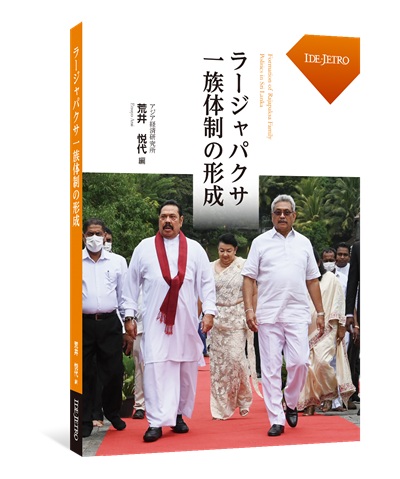Japanese eBooks
eBook

Formation of Rajapaksa Family Politics in Sri Lanka
Download eBook for free
Available in EPUB and PDF format for full book. EPUB files can be opened in eBook readers.
Buy the print-on-demand book
About this book
About this book
In Sri Lanka, political decision-making power was monopolized by Mahinda Rajapaksa, who became president in 2005, and his family, leading to assessments that Sri Lankan democracy was on the brink of collapse. Although the Rajapaksa family temporarily lost power due to electoral defeat, explicit family rule persisted until forced resignations following anti-government protests in 2022.
This book focuses on this distinctive political structure and its development, offering a multifaceted analysis to deepen the understanding of Sri Lankan politics. It examines the processes through which the Rajapaksa family consolidated power, the political environment surrounding the regime, and the constitutional amendments enacted to strengthen their authority. The book further analyzes the role played by Sinhala nationalism in facilitating the family’s rise, the changing political consciousness of rural Sinhalese voters who significantly influenced election outcomes, the unique features of fiscal management under the Rajapaksa administration, and the detailed dynamics of Sri Lanka’s relationship with China during the Rajapaksa family’s rule.
Contents
Introduction
Overview
The Rajapaksa Family in Sri Lankan Political History
Author: Etsuyo Arai
Chapter 1
Electoral Strategies and Political Methods of the Rajapaksa Family
Author: Etsuyo Arai
Chapter 2
Politics, the Constitution, and the Judiciary
Author: Shinya Imaizumi
Chapter 3
Sinhala Nationalism and Rajapaksa Family Rule
Author: Koji Kawashima
Chapter 4
Political Consciousness in Rural Sri Lanka
Author: Rika Masuda
Chapter 5
The Rajapaksa Family and Fiscal Management
Author: Jun Funatsu
Chapter 6
Family Rule and Relations with China
Author: Etsuyo Arai
Introduction
Introduction
This book is the culmination of a research project entitled “Family Politics in Sri Lanka” conducted as part of basic and comprehensive research at the Institute of Developing Economies (IDE-JETRO) from fiscal years 2022 to 2023.
This research project was initially proposed in the autumn of 2021. At that time, Gotabaya Rajapaksa was serving as president, while his brother Mahinda, known as the hero who ended Sri Lanka’s civil war, occupied the position of prime minister. Moreover, members of the Rajapaksa family had assumed key positions such as Speaker of Parliament, Minister of Finance, and other ministerial and state ministerial roles, seemingly consolidating national decision-making power within their family. Even within the South Asian political landscape, such explicit familial dominance represented a rare phenomenon.
Given this unique political structure, to better understand Sri Lankan politics we judged it particularly meaningful to analyze the processes by which the Rajapaksa regime was constructed, the political environment surrounding them, and the international dynamics at play. It was especially noteworthy that the Rajapaksa family, despite losing power in 2015, managed to regain control in 2019 and reestablish a solid political foundation, indicating that voters appeared to favor their governance. Analyzing and interpreting the strategy and rhetoric of the Rajapaksa family seemed to be of fundamental importance for researchers specializing in Sri Lankan studies.
However, by the spring of 2022, when our research group was launching its activities, the Rajapaksa administration—the very subject of our study—began showing signs of collapse. Triggered by a severe economic crisis stemming from a shortage of foreign reserves, large-scale anti-government demonstrations erupted nationwide, converging in the Galle Face area of Colombo. As a result, both the president and prime minister were forced to resign in quick succession. This unexpected development led us to incorporate analyses of the weaknesses of familial rule and factors contributing to its collapse—topics initially outside the scope of our research. The opportunity to document the Sri Lankan people’s commitment to political change proved invaluable, surpassing our original expectations.
Sri Lankan politics continued to evolve at an unexpectedly rapid pace thereafter. The 2024 presidential and parliamentary elections resulted in the victory of neither traditional major political party, but rather of a coalition primarily comprising smaller leftist parties, whose representative was elected president, while also securing an absolute majority in Parliament. These developments will be addressed in future work.
The Editor


